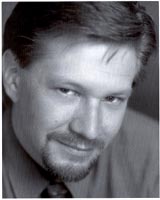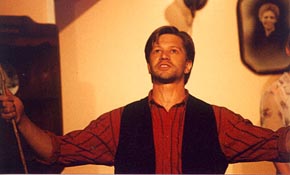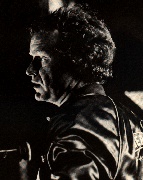



Alan J. Sanders is one of the busiest individuals I know. He's been active for years on stage directing "A Midsummer Might's Dream", "Steel Magnolias", "Twelfth Night", "Who's Afraid of Virginia Woolf?", "Macbeth", and "Romeo & Juliet." His stage acting credits include Mortimer in "Arsenic and Old Lace", Bottom in "A Midsummer Night's Dream", Fred Dickson/Rick Laredo in "A Gentleman and a Scoundrel", Bill Starbuck in "The Rainmaker", Macduff in "Macbeth" and Mercutio in "Romeo and Juliet." This resume of work has been with The Pumphouse Players.
Alan is currently working on a Star Wars fan film with SoLofty Productions entitled "Star Wars - Shroud of the Enemy". It's one of the biggest fan-based films I've ever witnessed and he's set to direct & produce in 2006!
INTERVIEW WITH ALAN J. SANDERS
by Barry King
Q. It's been written that you were once very shy and
at one time terrified of public performance. That's
hard to believe with the work that you're involved
with now (acting, directing, stage work). How did you
overcome that?
A. In my sophomore year in college, there was an announcement for a new class in the communications department called Folklore and Storytelling. The billing for the class said that students would learn the roots of stories in different cultures and how those stories were passed down from generation to generation. Being a 'writer' at that time, I thought I could learn something more about those traditions and grow as a writer. Well...turns out that 'storytelling' is a term reserved for the ORAL tradition -- the TELLING of stories out loud! The first day of class I really freaked out. I was like, "Oh, my, God! Am I really going to stay in this class?" Anyway, as I battled through the first few assignments, I started to enjoy the idea of performing. I think everyone realized we were all in the same boat so we figured no one would dare laugh at someone for fear the tables would be turned. Half-way through the class, my professor asked me to audition for a campus production and somehow, with 40+ people auditioning for 3 male and 3 female roles, I landed a part. I've been hooked into peforming ever since and that has only made me realize that fearing an audience is really silly. Whether it's a staff meeting, a board room, or a stage, I now thoroughly enjoy performing.

Q. Works by Shakespeare are intricate and chocked full
of dialogue that isn't spoken everyday. These works,
to unseasoned veterans, sometimes causes nightmares
either as a performer or director. How was your first
experience with the works of Shakespeare?
A. As an actor, I only auditioned for "Romeo & Juliet" because everyone I knew was going out for it as well. I hated Shakespeare at that time. Hated him! Looking back, I now know that my distaste for the Bard had to do with poor English teachers who had long since forgotten that Shakespeare was meant to be seen and heard! When I was cast in the show as a sword fighter and Romeo's man-servant, Balthazar, I fell in love with the play. From there I acted in "Macbeth" (twice), "The Tempest" (twice), "A Midsummer Night's Dream" (twice), "Taming of the Shrew", "Romeo & Juliet" (again), and "Twelfth Night; or What You Will". With each show I became more and more enamored with the sheer genious of Shakespeare.
But, then it was time to direct. I chose "Romeo & Juliet" not because it is my favorite of his plays (which it is not), but because I knew it would be much more accessible to the youth of the community. I knew I needed to literally teach my actors how to look at the text -- how to scan their lines and find the embedded blocking. From there, I also had to teach my sword fighters how to use their rapiers and then I had to teach myself how to choreograph several fights and duels. AND, on top of that, I had get real performances out of the actors. I had to convince them that the words really weren't that hard to follow if they truly understood the text and felt the emotions. It's the same principles we expect from actors in a contemporary play -- realisim.
After "R&J" I quickly moved into directing "Macbeth", "Twelfth Night", and "A Midsummer Night's Dream". Each of these shows had its own challenges and gave me a great sense of satisfaction. I have been granted a precious gift -- bringing the Bard to life over and over again on stage. If I never get to do anything more in my life, I will cherish those memories until the end of my days.
Q. You have seen past shows that you thought were not
directed the right way -- or at least, didn't push the
acting as far as he thought it could go. Can you give
us an example of pushing an actor on stage as a
director?
A.Lots of shows don't push the actors. It's as though the directors are more worried about hurting feelings instead of doing their jobs! It's a lot like being a parent. A good parent knows they can't be their best friends with their children. It doesn't work that way. You have to be the boss; you have to make the tough decisions in instill a sense of discipline. Everyone knows that the 'boss' can't always be loved because they are there to make sure work is getting done.
As to my approach, there are a few things I tell my actors in every production:
1) "You suck! You will always suck. You just need to suck less than the next guy!" This reminds us all that humility is the only way we can be open to personal growth. The moment I run into someone that 'knows it all' they can be in someone else's show. I am interested in always growing, always learning, and never settling for less than my absolute best. 2) "You must trust me. I want everyone to shine! Why in the world would you think that I would knowingly have you look bad on stage, only the hurt the show and my reputation?" As crazy as it sounds, sometimes it's good to remind the actors that the director's reputation is at risk as well! 3) "If you become the character, you will react as the character should. Not as you THINK they should, but actually HOW they should. It all stems from listening and reacting. In essence, there is no acting -- only reacting." This is a favorite of mine and it gets said over and over again. Too often a bad performance can be spotted because it just looks like the actor is reciting lines that have been memorized. The really good performance is the one where it looks so natural it's like the words are being spontaneously spoken for the very first time.
I think I am a little heartless when it comes to getting the scene. But I owe it to them. If I just joke around on the set and make things pleasant, but don't get what the scene is about, then I'm doing them a terrible disservice. For example, in a production of "Steel Magnolias" the actress playing Shelby needed to have a seizure on stage. The actress was worried that it would look fake. I assured her that I would get the right level of wide-eyed panic and to trust me. A little later as we were getting ready to work on some opening blocking, I asked Shelby to sit in one of the chairs and brought the other actresses on stage. Then, without warning, I looked at Shelby and said, "Now, GO!" She looked at me with wide-eyes and a gaping mouth. "Go??" she asked, suddenly looking like the blood had left her face. "YES!! GO! Start shaking!" Of course, the performance wasn't right -- it wasn't even close. But, that feeling of instant loss of control and immediate panic stuck with her and that's when I told her that THAT was exactly how Shelby would feel as the seizure was coming on and there was nothing she could do to stop it. WIth that thought in mind, she had the mental tools she needed to make that scene ring true.
I am also a big believer in physicality. Too often actors are afraid to grab each other or get physcially rough or intimate (depending on the play). The sooner an actor can get a script out of their hands and start to play in the world being created on the stage, the sooner the actor will BECOME the character.


Q. You've been involved with The Pumphouse Players in Georgia for many years. How did you first become
involved with that group?
A. I auditioned for a show because I was working up in town and figured I could go to rehearsals after work. I was still in college so I was bouncing between shows on campus and shows in Cartersville. I also did some plays in Marietta and in Cherokee county. However, once I got married and moved to Cartersville, I just counted myself lucky to have such a fantastic outlet available to me.
Q. You've acted in stage and film, any problems
between transitioning from one to the other?
A. The hardest thing is learning how to compress the performance for camera. On the stage, your whole body is in the audience's view the entire time. You also need to be heard by the poor folks sitting in the very back row. Thus, most stage actors learn how to speak a bit louder and animate their movements a bit more to create a more lively performance for that back row. The camera, however, might be only inches from an actor's face and thus it captures everything -- often acting as a magnifying glass. A good piece of advice I try to keep in mind states, "The stage actor has to be loud but the movie actor only has to think loud." In other words, the intensity of emotion is no less important for the film actor, it just has to be kept in the background, driving every look or emotion.

Q. As an admirer of motion pictures, acting, directing
and all that encompasses the art, do you have any
major influences?
A. One of my major influences is Steven Spielberg, especially his earlier work leading up to "Saving Private Ryan." Movies like "Jaws", "Close Encounters", "Raiders of the Lost Ark", "Schindler's List", "Amistad", and "Jurassic Park" are among some of my all-time favorites to watch. He never seems afraid to pick lesser known actors to fit the roles and he loves to get the camera right in the middle of the action. I truly believe he has this gift to know what to capture on film and how it should be used in the edits to maximize the emotional impact moment to moment.

Another director I am quite fond of is Ridley Scott. Whether it's setting the mood of a sci-fi film noir in "Blade Runner" to the atmospheric treat to the fantasy senses in "Legend" or as one of the only people I know who could pull off a gothic horror movie in space with "Alien", Ridley Scott continues to impress me with the range of topics he has chosen to handle as a Director. "Gladiator" is another film that proves action movies do not need to be devoid of character and substance!
Other directors include Christopher Nolan, Tim Burton, Michael Mann, and Mel Gibson.

Q. The SoLofty Productions website has launched and
you, with several talented individuals, have started
production on a Star Wars film called "Shroud of the
Enemy". From first hand knowledge (and knowing you
personally), this is going to be a major production.
It's a first for you as a motion picture director.
What are your thoughts on choosing such a massive
project to direct?
A. I've laughingly said this before and eventually I'm going to be in trouble for truly believing it -- I'm just too stupid (ignorant?) to realize that no one in their right minds would attempt this without the proper experience. I've actually always been this way. When I took that storytelling class, I never imagined I could actually act. I just didn't know I wasn't supposed to. When I got into the IT field, I didn't have a degree in computers, but I just didn't know that I needed something like that to succeed in the field. When I've tackled projects at work there have always been people around me who utter platitudes of doom and gloom, telling me how nothing can change and I'm just setting myself up for failure by trying. But, once again, my successes have been a result of not knowing any better! I just assume if I work hard, never give up, and keep a positive attitude, I can make things happen. So, eventually, this streak I am on has to give. I just hope it's not with this project.
Ironically, I do know how insane this is to attempt. It's an act of sheer lunacy! But for some reason, that only sets the bar a little higher for me and I really hate to fail! I don't mind setbacks. Setbacks are just indications that you have to rethink the solution. Failure, however, is giving up and I never give up. Ever.
Q. You've accomplished a lot over the past 6 months
(2005-2006)- new projects, new website and new
freinds. What can the public expect to see coming from
SoLofty in the future?
A. Ideally, I hope SoLofty Productions, Inc. can become a place where independent filmmakers and film-minded resources can come together to make movies. By partnering with the right people, we hope to create a web of like-minded individuals who want to work collectively to make dreams come true. For too long, I've been auditioning for other people's short or indie films only to see them fall apart due to lack of planning or lack of drive. My intention would be to provide the kind of focus and energy to keep projects moving forward, allowing every resource involved to see their work and talent high-lighted. I believe in surrounding myself with the very best people and sharing the spotlight with as many people as I can. In my mind, that is the best way to lead a team and the best way to give us all a path to success.
Thanks Alan!
